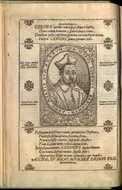Warwick-Newberry Workshop: Reading Publics in Fifteenth and Sixteenth Century Renaissance Europe
Workshop on Paratexts: Monday, March 19, 2012. 9-5pm
This workshop was focused upon the relationship between paratexts and reading publics in fifteenth- and sixteenth-century Europe. The workshop aimed to explore a series of questions – definitional, textual, historical, and theoretical – raised by the idea of the paratext. The workshop also aimed to put into dialogue scholars and students working across different languages (Hebrew, Latin, Italian, Greek, German) and in a variety of fields (vernacular literature, Bible and biblical commentary, philosophy and philosophical commentary; grammars and textbooks; art history). As in the previous workshop, a strong emphasis was placed upon aspects of preliminary overview in the presentations and to allowing a broader comparativist framework to emerge. The papers at the workshop thus concentrated in complementary ways on the functions of paratextual material (e.g. lives, illustrations, prefaces, addresses to the reader, dedications), and their roles in controlling and directing readers, and in responding to and creating reading publics of various kinds. These issues and topics were addressed by the four speakers, two respondents, questions and in the roundtable discussion.
The workshop was very well attended with over twenty participants in total. The grant allowed us to fully fund three US and one UK speaker, two US respondents (Kenneth J. Knoespel and Michael Wyatt), and six Warwick colleagues (Drs. Ingrid De Smet, David Lines, Eugenio Refini, Penny Roberts, Maude Vanhaelen). A further five graduate students and recent postdoctoral scholars (Leah Jenkins Giamalva, Miranda Garno, Richard Oosterhoff, Efthymia Priki, and R. Allen Shotwell) were also funded from the grant. Two other staff/PhD students (Laura Aydelotte, Jill Gage) from the Newberry Library were also in attendance.
As with the first workshop, this made for a lively and highly focused group of scholars, whose interests ranged geographically (esp. England, Italy, France, Germany) quite widely and in terms of discipline (historians, intellectual historians, historians of science, literary specialists, classicists, historians of the book, art historians), but who all shared a keen interest in fifteenth- and sixteenth-century print culture. The day was organized around four papers (each of 30-45 minutes with questions): each group of two papers was followed by a ‘show and tell’ session, where Newberry Library material was brought to a reading room for closer inspection, allowing further discussion and questions to the speakers. This was followed by an extended round-table discussion that drew a number of stimulating contributions from the invited respondents and other colleagues.
We were able to hear papers from leading specialists in the field who were able to illuminate the ways in paratexts functioned as marketing devices, readerly supports of various kinds, texts in their own right. Prof. Simon Gilson spoke on fifteenth- and sixteenth-century Italian print editions of Dante’s Comedy; Prof. Adam Shear spoke on sixteenth-century prints of Hebrew works in Italy and imagined audiences; Prof. Joseph Freedman considered paratexts in philosophical writings in Early Modern Europe; and Dr. Paul Gehl spoke on advertising grammar textbooks in the sixteenth century.
In the roundtable, we discussed: the relationship between paratext and other kinds of text (including commentary) and the ways in which paratexts might become texts in their own right; the complex intersections between marketing and scholarship; how paratexts extended into the world in pratical ways; the place of paratexts within the context of specific published books; questions related to the level of readership of paratexts; the continuities between printed paratexts and the paratextual features found in manuscript.
This is one of a series of collaborative programs of the University of Warwick Centre for the Study of the Renaissance and the Newberry Center for Renaissance Studies, funded by a generous grant from the Andrew W. Mellon Foundation.

Pietro Cerone, El melopeo y maestro, 1613. Author portrait. Newberry Case VMT 6 .C416m

